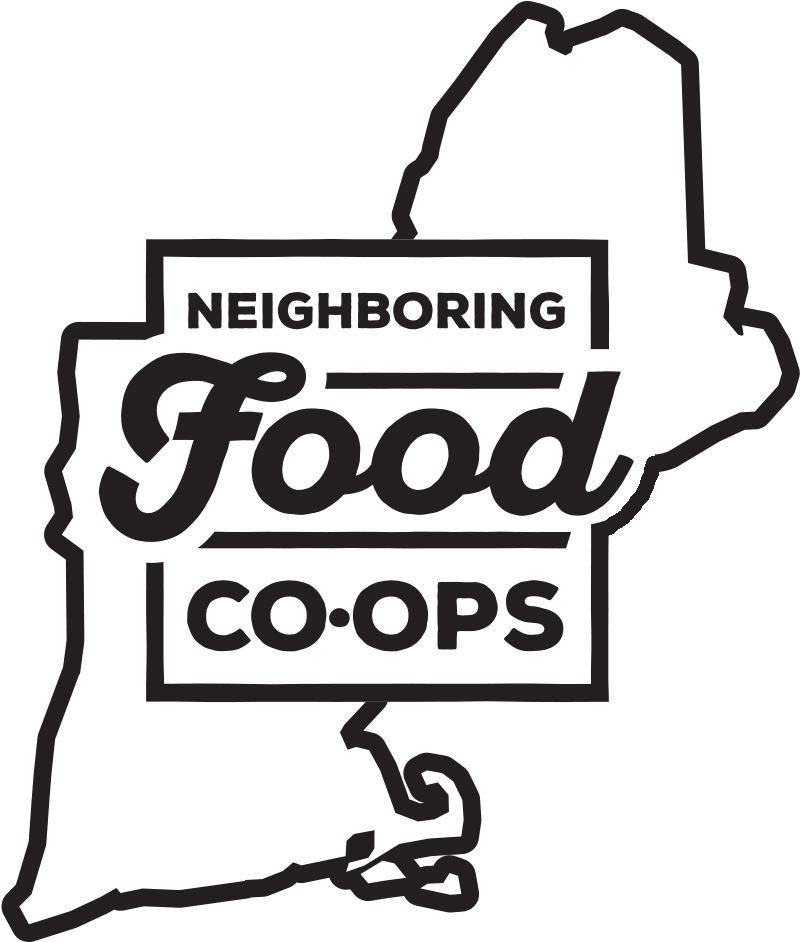
Your Neighboring Food Co-ops
Locally Owned by More Than
100,000 People Like You!
In this Month’s E-News, check out:
- NH Food Co-ops: Champions for SNAP Incentives Programs
- Testifying: Co-op Impact on Local Food System
- Co-op Enterprises Build a More Inclusive Economy
- NFCA’s Annual Meeting: From Soil to Sovereignty: Good For For All
- Farm to Freezer: NFCA Corn & Peas
- February’s Cave to Co-op Special
- To Our New England Farmers Union Friends…
- Our Neighborhood Co-op Calendar
NH Food Co-ops: Champions for SNAP Incentives Programs
In January, staff from the Neighboring Food Co-op Association (NFCA) and New Hampshire member co-ops attended the Statewide NH SNAP Incentives Gathering in Concord, hosted by Fair Food Network, Granite State Market Match and New Hampshire Children’s Health Foundation.
The event highlighted two NFCA Member Co-ops, Co-op Food 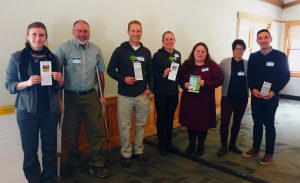 Stores and Littleton Food Co-op, and their leadership in food security as champions of new SNAP (Supplemental Nutrition Assistance Program or Food Stamps) programs that build on their existing Healthy Food Access program by making nutritious local food grown by local farmers more affordable for low-income families.
Stores and Littleton Food Co-op, and their leadership in food security as champions of new SNAP (Supplemental Nutrition Assistance Program or Food Stamps) programs that build on their existing Healthy Food Access program by making nutritious local food grown by local farmers more affordable for low-income families.
More than forty symposium attendees represented a diversity of organizations working on food security in our region, including NFCA Healthy Food Access project partner Hunger Free Vermont. Throughout the symposium, food co-ops were highlighted as champions and leaders in the work to pilot new incentive programs at grocery stores, in part because of their unique member-owned business structure, autonomy and flexibility, and their core purpose of meeting the needs of their community rather than maximizing profit.
“I’ve been thrilled to work with the Co-op Food Stores to implement Double Up Food Bucks,” said Liz Alpern, program manager for Double Up Food Bucks Northeast, a Fair Food Network program. “These three Co-op stores are clearly committed to ALL of their customers and to making regionally grown produce accessible to everyone in the community. This commitment has paid off – the Co-ops are seeing increasing participation in Double Up every month and we expect this growth to continue.”
Fair Food Network, a national leader in SNAP incentives and one of the first organizations to bring them to grocery stores, has been working in with Neighboring Food Co-op Association’s member food co-ops to help expand the Double Up Food Bucks produce incentive program to food retailers.
Co-op Food Stores (NH & VT), was highlighted as the first success story in the keynote presentation, with graphs of their impact of increasing produce as a percent of total sales over the past couple years, thanks in part to the Double Up Food Bucks. The program at Co-op Food Stores, “provides SNAP recipients with significant savings on the wide range of local fruits and vegetables from the Co-op’s long list of local farmers,” said Ed Fox, General Manager of the Hanover Consumer Cooperative Society, which operates the stores in Hanover, Lebanon and White River Junction. Through the program, customers can receive a 50 discount on fresh produce purchased with electronic benefit transfer (EBT) cards, helping them stretch their dollars by providing them with a discount on fresh produce.
“Through the Double Up Bucks program, over 300 Upper Valley residents have extended their SNAP benefits on fresh fruits and vegetables,” said Emily Rogers, Member Education Manager at Co-op Food Stores. “From June to December, 2018, we saw an additional $11,208 dollars spent on local produce through the program. Double Up Food Bucks has given our Co-op a tool to help meet our goal and vision of a well-nourished community, cultivated through co-operation.”
Food security partners from New Hampshire Food Bank also acknowledged Littleton Food Co-op’s important role in healthy food access in the Granite state. Littleton Food Co-op (NH) is part of the Granite State Market Match program, another statewide program to help make healthy, locally grown fruits and vegetables affordable for participants in SNAP. While Granite State Market Match is primarily available at farmers’ markets, Littleton Food Coop was able to implement the program so successfully in part because of its close ties to their local farmers market and local farmers.
Granite State Market Match (GSMM) and Double Up Food Bucks both allow SNAP customers to match the value of their benefits for fruit and vegetables dollar for dollar. By spending $10 in EBT, shoppers can purchase a total of $20 worth of fresh, local food. The Littleton Co-op also staffs the Market Match booth at the Littleton Farmers’ Market every Sunday.
“In just 15 months, our Market Match Program has grown 400% to more than $2,500 a month, said Ed King, General Manager of Littleton Food Co-op. “It has also had the side benefit of increasing the impact of our Healthy Food Access program overall.”
The conference included policy implications for SNAP incentives, and strategies on how our food co-ops, and food security partners can work to expand these programs to other New England states.
For more information in NFCA’s Healthy Food Access program, visit nfca.coop/healthyfoodaccess.
Testifying: Co-op Impact on Local Food System
Every year, the Neighboring Food Co-op Association (NFCA) conducts a survey of member co-ops to help us measure and communicate our shared impact on the regional food system and economy. In this story, Kari Bradley, Hunger Mountain Co-op General Manager and NFCA Board Member, shares how this data came in handy when he was invited to speak to the Vermont House Agriculture Committee: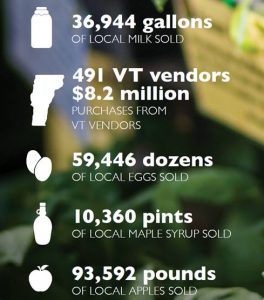
Recently, I had the opportunity to testify before the Vermont House Agriculture Committee on the topic of how food co-ops in our state support our local food system. They wanted to hear from a co-op because of the recent great news from the 2018 Farm To Plate Annual Report: last year, $289 million or 12.9% of Vermont’s food and beverage sales were from local sources, an impressive increase from 5% in 2010. Moreover, 15% of these sales came through food co-ops, which speaks to the significant role that we play in our local food system. On average, a third (33%) of the food sold at NFCA Member Co-ops is locally sourced, compared to the state average of 12.9%.
Vermont currently has fifteen food co-ops and start-ups operating 14 storefronts, including Co-op Food Stores White River Junction store. Together, these co-ops had shared revenue of $127 million and sold an estimated $42.5 million in local products last year. Vermont food co-ops are growing in number (Including new co-ops such as Morrisville Food Co-op), expanding in place (Putney Food Co-op and Middlebury Natural Foods Co-op), and opening second locations (City Market, Onion River Co-op). We are also innovating, especially in the realms of prepared foods and healthy food access. Data from 2017 shows four co-ops (including Hunger Mountain) gave over $280,000 in discounts to low-income shoppers, helping to make fresh, local food more accessible for people with limited incomes. Common to our business models, Vermont food co-ops have demonstrated that local products can be a central piece of a successful retail brand in the hyper-competitive grocery industry.
Each of our co-ops has a team of buyers across a variety of product categories responsible for working with local producers. We work with new and prospective vendors, helping them bring their products to market, sharing our experience with the details of customer preference, product quality, packaging, price points, promotion, distribution and more. We work with established producers to promote their products and plan for the next growing season. While we have many longer-term vendor relationships, there continue to be growth opportunities. A great example is Joe’s Soups, which has grown from micro-batches for his CSA customers to regional distribution to retailers and restaurants over the past decade.
One of my key points to the House Agriculture Committee was that food co-ops offer an important opportunity in local food system development. Because local is baked into our businesses, more food co-ops means more local vendors will be able to get more of their products available to customers daily and year-round. Our latest success story is Morrisville Food Co-op, where the community now has a small but thriving store with clear focus on local in a town that already had two big-box grocers. We are also supportive of the efforts of Granite City Grocery to open a store in Barre, where there will be a mix of products but local will play a key role. The NFCA is working with start-ups like these to connect them the support of experienced peer co-ops, technical expertise and capital.
We also have to think regionally in order to support local. Most Vermont food co-ops are NFCA members. Our association now includes 35 food co-ops across New England and New York State with 140,000 member-owners, 2,000 employees, $300 million in revenue, and selling $90 million in local products. By pooling our buying power, we have been able to work together on regional sourcing projects to increase our impact for small producers across our region. Examples include Cave to Co-op, focused on promoting local artisan cheeses, and Farm to Freezer, our branded line of Northeast grown frozen fruits and vegetables.
Here’s to another decade of progress for our local food system, with food co-ops playing a central role, contributing to the benefit of all in our region.
—Kari Bradley, General Manager, Hunger Mountain Co-op
Co-op Enterprises Build a More Inclusive Economy
A recent article in The Economist, 5 Ways Leading a Co-operative is  Different from a Corporation, featured Karen Miner, managing director of Co-operative Management Education at the Sobey School of Business, Saint Mary’s University, who shared how the co-op business model is being used to build a more inclusive economy. “When you want businesses owned by a collective group and democratically controlled, co-ops are one of the only models that hard codes that into their structure,” said Miner.
Different from a Corporation, featured Karen Miner, managing director of Co-operative Management Education at the Sobey School of Business, Saint Mary’s University, who shared how the co-op business model is being used to build a more inclusive economy. “When you want businesses owned by a collective group and democratically controlled, co-ops are one of the only models that hard codes that into their structure,” said Miner.
“The guiding principle behind co-ops, that they are member-controlled businesses driven by values and not just profit, makes them different from investor- or shareholder-owned corporations. Similarly, leading co-ops is a world apart from leading traditional companies.” Miner explains some of the reasons why. Read the whole article here…
Neighboring Food Co-op Association will be hosting another training with Miner and Saint Mary’s this October 24 – 25, 2019 in Greenfield, MA. Enhancing Co-operative Business Performance: How to Strengthen Identity, Loyalty and Participation will be an interactive intensive professional development opportunity focused on learning new practices leading thinking in co-operative management coupled with tangible examples of how to translate knowledge into action. More info here: https://nfca.coop/events/

Thanks to CoBank for their support of our Neighboring Food Co-ops
NFCA’s Annual Meeting: From Soil to Sovereignty: Good For For All
MEMBER CO-OPS & PARTNERS: SEE YOU THERE!
The Neighboring Food Co-op Association (NFCA)’s 8th Annual Meeting & Member Gathering is coming up on Saturday, March 23rd, 2019. This day-long training and networking event is a free event for up to four representatives of our Member Co-ops, including General Managers and Board Chairs, and other designated Staff and Board Members.
The theme of our Annual Meeting this year is, “From Soil to Sovereignty:  Good Food For All.” We’ve got a day packed with networking and learning, including a keynote address by Ruth Tyson, Coalitions Coordinator for the Food & Environment program at Union of Concerned Scientists (UCS). Ruth facilitates the Good Food for All Coalition, which unites grassroots and national organizations around a vision for a just, equitable, and sustainable food system through Federal farm and food policy that centers restoration and reparation. UCS has advocated for programs like the Supplemental Nutrition Assistance Program (SNAP) and incentive programs like the Food Insecurity Nutrition Incentive Program, as well as healthy soils and procurement policies that promote proper care of the land and people our food system thrives on. We hope you will join us for this dialog on the role of our Food Co-ops at the intersection of food security, diversity and inclusion, economic democracy, and climate change as we look to the future.
Good Food For All.” We’ve got a day packed with networking and learning, including a keynote address by Ruth Tyson, Coalitions Coordinator for the Food & Environment program at Union of Concerned Scientists (UCS). Ruth facilitates the Good Food for All Coalition, which unites grassroots and national organizations around a vision for a just, equitable, and sustainable food system through Federal farm and food policy that centers restoration and reparation. UCS has advocated for programs like the Supplemental Nutrition Assistance Program (SNAP) and incentive programs like the Food Insecurity Nutrition Incentive Program, as well as healthy soils and procurement policies that promote proper care of the land and people our food system thrives on. We hope you will join us for this dialog on the role of our Food Co-ops at the intersection of food security, diversity and inclusion, economic democracy, and climate change as we look to the future.
Look for more information soon. In the meantime, please contact Bonnie Hudspeth for more information (bonnie@nfca.coop).
Farm to Freezer: NFCA Corn & Peas
Last year our co-ops sold over 5 thousand pounds of NFCA frozen 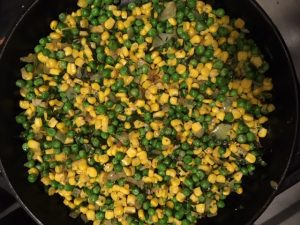 blueberries and vegetables! Our co-ops have a commitment to source local and regionally-grown fruits and vegetables supporting family farms and have ingredients for healthy meals all year long. These are the ingredients for building a sustainable, regional food system as well!
blueberries and vegetables! Our co-ops have a commitment to source local and regionally-grown fruits and vegetables supporting family farms and have ingredients for healthy meals all year long. These are the ingredients for building a sustainable, regional food system as well!
Look for our Northeast Grown Frozen Fruits and Vegetables in the freezer section. They’re easy to find because they’re packed in a clear package, so you can see what’s inside. Corn and peas are two of the available NFCA frozen and go great together in many recipes. Your co-op has the ingredients you need for making simple, nutritious, and creative meals all year-round including frozen corn and peas!
Succotash is a dish built around corn and some kind of bean or legume. Succotash is from the Narragansett word sohquttahhash, meaning “broken corn kernels”. This traditional dish, a combination of a grain with a legume, is high in essential amino acids. Other ingredients may be added including tomatoes, green or sweet red peppers, and okra. Succotash can also be made using bacon or chicken broth, but here is an easy vegetarian version.
Succotash
Ingredients
- 3 tablespoons extra virgin olive oil
- 1 small onion, diced (about 1/3 cup)
- 2 cups frozen corn
- 1 garlic clove, minced
- 1-1/2 cups peas, defrosted
- 1/4 cup chopped fresh basil
- 2 tablespoons chopped fresh parsley
- ½ tsp kosher salt
- ¼ tsp black pepper
Instructions
- Sauté onions in olive oil until translucent.
- Add corn, salt and pepper.
- Add garlic, and cook until garlic is fragrant, about 2-3 minutes.
- Stir in peas, simmer until peas are heated, about another 2 minutes.
- Remove from heat and stir in fresh basil, and parsley.
- Serve hot, warm, or at room temperature.
The vision of the Neighboring Food Co-op Association is of a thriving co-operative economy, rooted in a healthy, just and sustainable food system and a vibrant community of co-operative enterprise. Bringing Northeast grown fruits and vegetables to you by your co-op is a part of this sustainable food system, supporting family farmers all year long.
For more Farm to Freezer information and recipes visit: www.nfca.coop/farmtofreezer
February’s Cave to Co-op Special
Grafton Clothbound by Grafton Village Cheese Co., Grafton, VT
The Grafton Village Cheese Company was founded in 1892 as the Grafton Cooperative Cheese Company to convert surplus milk from local dairy farmers into cheese. In 1912, the cheesemaking factory burned down and the community had no cheese facility until 1962, when the Windham Foundation restored the factory and brought cheesemaking back to the community. The profits from Grafton Village Cheese go back into the Foundation to further its commitment to keep rural Vermont alive and thriving.
Clothbound Cheddar is classic milled curd cow milk cheddar wrapped in cheesecloth while it ages slowly in Grafton’s own caves for a minimum of six months. Grafton Clothbound delivers a very bold cheese with both nut and mushroom notes. It is delicious any time of year on a cheese plate or in a sandwich or just eaten out of hand.
Cave to Co-op is a partnership between Provisions International and the Neighboring Food Co-op Association (NFCA) to support artisanal cheese producers in our region and make their products more easily available to co-op shoppers. Each month, a delicious local cheese is featured at a great price.
Here’s a hearty soup recipe featuring Grafton Clothbound, great for cold winter days.
Grafton Clothbound Cheddar Soup with Kielbasa
Serves 6-8
- 2 tablespoon and 2 teaspoons neutral vegetable oil
- 1 onion, chopped
- 2 cloves of garlic, chopped, 6 T unsalted butter
- 1/3 C all-purpose flour
- 3 C chicken or vegetable broth
- 12 oz. beer or ale
- ½ C cream
- 8 ounces Grafton Organic Clothbound Cheddar, grated
- salt and pepper
- 1 lb. Kielbasa sausage, sliced thinly
- paprika to taste
Heat 2 Tbsp. oil in a large heavy pot over medium heat. Add onion and cook, stirring occasionally, until soft but not browned, 8–10 minutes. Add garlic and cook, stirring constantly, until fragrant, about 1 minute. Add butter and stir until melted. Add flour and cook, stirring constantly, until beginning to turn golden brown, about 4 minutes. Whisk in broth, beer, and cream. Bring to a boil, reduce heat, and simmer, whisking occasionally, until thickened, 10–15 minutes. Reduce heat to low and whisk in cheese a handful at a time, whisking to combine after each addition. Cover and let sit for 10 minutes to ensure cheese is melted. Use an immersion blender directly in the pot to purée the soup until it is smooth. Add salt and pepper to taste.
Cook sausage pieces in a skillet with 1 teaspoon of oil, turning occasionally, until crisp and golden. Divide soup between bowls and top with sausage and a sprinkling of paprika.
More info and recipes: https://nfca.coop/cave-to-co-op-february-2019/
For more information on Cave to Co-op, visit: www.nfca.coop/CaveToCo-op
To Our New England Farmers Union Friends…
Dear Friends of New England Farmers Union,
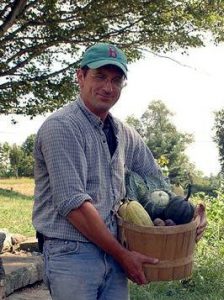 On behalf of New England Farmers Union (NEFU), thank you for your support and engagement over the years. Our efforts are guided by individuals like you, who play a significant role in supporting our local food economy and family farmers. Driven by the diversity of our grassroots members, New England Farmers Union has worked to shape farm and food policy to create an environment in our region and country in which family farms can continue to thrive.
On behalf of New England Farmers Union (NEFU), thank you for your support and engagement over the years. Our efforts are guided by individuals like you, who play a significant role in supporting our local food economy and family farmers. Driven by the diversity of our grassroots members, New England Farmers Union has worked to shape farm and food policy to create an environment in our region and country in which family farms can continue to thrive.
Over the past 12 months, NEFU members have advocated for the interests of American family farms to their local communities, state governments and federal offices in Washington, D.C. We played an important role in passing a Farm Bill and protecting farmers amidst the worst downturn in the farm economy in decades. The bill contains several key wins, including provisions that support the sustainability of family-owned operations. We’ve taken on some of the largest companies that continue to consolidate input and export markets and been vocal about the effects of current trade battles.
2018 also presented some significant challenges for us. Our small, mostly volunteer-based, organization faced administrative challenges that restricted our ability to communicate and engage our entire membership. Staff turnover and systems failures set our organization back and we sincerely apologize for the lapse in our regular correspondence. Many of you did not receive our organizational updates and requests to renew your membership. If you were among those we missed, we sincerely apologize.
Moving forward, we are working with our colleagues in the National Farmers Union office to ensure we correct and prevent this problem from reoccurring. With their administrative systems and staff, we will be able to maximize our time and resources, focusing on the issues most important to our members.
With the recent introduction of the Green New Deal, we are energized to see so much of our values and priorities laid out in a visionary document. The Farmers Union remains committed to clean air and water, and access to nature, healthy food access for all, an economic environment free of monopolies, and clean renewable energy.
Now we need to grow our membership so that we can continue to be a respected and powerful voice for a sustainable food system and independent family farming. I am asking you to support our vibrant and growing organization by joining or renewing your membership in New England Farmers Union.
We are especially appreciative of our partnership with the Neighboring Food Co-op Association (NFCA), representing the collaboration of producers and consumers in advocating for a better food system in the Northeast. Because of this relationship, you can enjoy the following special benefits:
-
- NFCA Member Food Co-ops can join NEFU at a special rate of $100, rather than the regular Business Membership of $150. (Click HERE for more information.)
- This is also a great time to let your individual Food Co-op Members can also join NEFU at a special “Friend of the Farmer” rate of just $15. (Click HERE for more information.)
Your membership and its associated dues go a long way in allowing us to continue our work of supporting the health of local farms and rural communities. If you already are a member, please reach out to Ethan Whitmore (ewhitmore@nfudc.org) in our National Farmers Union office to be sure we can keep you updated with our ongoing efforts.
Thank you again for your support of New England Farmers Union.
Sincerely,
Roger Noonan, President
* * * *
The New England Farmers Union Needs You!
If you care about where your food comes from and want to support the people who produce it, consider joining NEFU as a Friend of the Farmer for just $15. Your membership will help ensure that our region’s producers and consumers are heard by policy makers here at home and in Washington, DC. For more information, please visit www.newenglandfarmersunion.org.
The Neighboring Food Co-op Association (NFCA) is an affiliate member of the New England Farmers Union (NEFU), representing our commitment to collaboration among consumers and our region’s family farmers and fishermen to influence food system policy and build a more vibrant, resilient and co-operative food system in the Northeast.
Our Neighborhood Co-op Calendar
For More Co-op & Food System Related Events visit:
MARCH 2019
March 1 – March 2, 2019
Up & Coming, Up & Running (For Start-Up Food Co-ops), Milwaukee, WI
http://icdc.coop/up-coming-2019
March 23, 2019
Neighboring Food Co-op Association 8th Annual Meeting
(For NFCA Member Co-ops)
The Neighboring Food Co-op Association (NFCA) is a co-operative federation of 35 food co-ops and start-up initiatives across New England, working together toward a shared vision of a thriving co-operative economy, rooted in a healthy, just, and sustainable food system and a vibrant community of co-operative enterprise.

